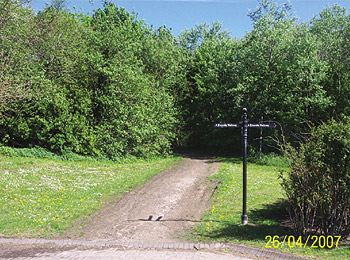
| HOME |
| NERVE |
| REVIEWS |
| ARCHIVE |
| EVENTS |
| LINKS |
| ABOUT US |
| CONTRIBUTORS |
| BACK ISSUES |
| CONTACT US |
Back to index of Nerve 16 - Summer 2010
Nice work if you can get it!
In these times of austerity and cutbacks Nerve suggest that some of the public money coming into Merseyside be re-directed to community projects. Here are three examples of where money could be saved.
 |
 |
| Photos taken from the old landing stage on the Prom. The signpost
has been changed, but just look at the difference over the three years
between the photos! I would argue that the contractors had no right
to remove entirely the greenery on the left of the path which is,
surely, part of OUR Prom? Photos and comment by David Jones from Friends of Liverpool Garden Festival |
From Dump to Prime Location
It's win-win for Langtree, the owners of the Garden Festival Site, who have been given £3.7m by the North West Development Agency (NWDA) to restore the park area. They only have to pay anything back if, or when, they go on to build homes on the other section of the site.
So, if they don't build anything they don't pay anything. Meanwhile, their land gets a facelift at public expense, they get paid to do it, and they get credit for restoring the 'iconic' part of the site. There is also the added bonus that the site value rises, while getting full planning permission to build 1,300 dwellings becomes a fait accompli for Langtree.
Nerve asked the NWDA at what stage of the development Langtree had to return the £3.7m grant. Their reply was that the sum agreed had been negotiated by Liverpool City Council and that they didn't have to say because of an exemption under the Freedom of Information Act.
We then asked the Liverpool City Council if this was a good use of public funds. Their reply was that this was not quite the win-win situation suggested. That Langtree had "invested a considerable amount of money in this site already, having bought it from the previous lessees and then taken it through a lengthy planning process". But that "whilst it is true that they won't have to repay the grant until the rest of the site is developed they won't make any profit on it either until that happens.”
Nerve suggest that Langtree should be made to start repaying now instead of waiting until they receive profits back from houses that may never be built.
Top earners earn more at Liverpool University
According to figures published in The Guardian, the University of Liverpool Vice Chancellor, Howard Newby, is the third highest paid university head in the country. His earnings (including pension) for 2008/09 were a whopping £386,000.
Since taking over in July 2007, Newby has imposed a freeze on contract renewals, forcing many temporary workers out of a job, and has tried to close three departments. Those departments of Politics, Philosophy and Statistics were saved only after a campaign by students and the lecturers’ union UCU embarrassed the Vice Chancellor into reversing his decision.
Howard Newby took the top job at Liverpool after leaving his post at the University of the West of England amidst widespread reports of corruption. Private Eye revealed that Newby was non-executive director of a private consultancy firm that received a sizeable contract from the University of the West of England. Liverpool University lawyers have recently been used to silence the ‘Bristol Blogger’ who has made further allegations about Newby’s corruption.
Since Newby arrived at Liverpool, the most insecure staff have been made less secure and the richest have got richer. The number of people at the University earning more than £100,000 has trebled since 2007. There are now 112 on the payroll who take home a salary higher than £100,000. At the same time, further job losses are expected as a result of Newby’s restructuring of the University.
Still no jobs for Merseysiders
Liverpool continues to be the most deprived local authority in England in terms of income and employment. There is little evidence that much has changed in terms of employment conditions in the city. Liverpool still has the lowest employment rate of any city in the UK. It also has a skills rate that is beaten to the bottom of the pile only by Burnley. It is this position, combined with the vulnerability of the public sector to cuts that puts Liverpool in the group of cities “highly vulnerable” to recession.
The situation beyond Liverpool and into the other Merseyside areas is not much better. All six authorities in the Merseyside area have wage levels below the UK average. Of those six, only Sefton has a higher than average employment rate. In addition to Liverpool, Knowsley and St Helens have employment rates far below the UK average.
Meanwhile there are currently 20 members of staff within Liverpool City Council who receive more than £100,000 a year in annual salary.
Sources: Freedom of Information request to Liverpool City Council and their own 2007 analysis of the UK Indices of Deprivation. Also Centre for Cities Outlook 2010.